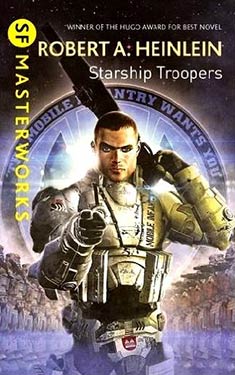RYO Review: Double Star by Robert A. Heinlein
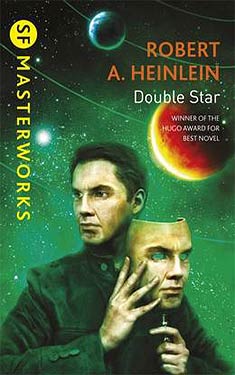
 To begin with a digression, I was never much of a Robert A. Heinlein fan. Growing up as a science fiction kid in the 1970s, I couldn’t understand what all the fuss was about, but back then, being indifferent to Heinlein made me question my tastes. Everybody seemed to love Heinlein. He was one of the “big three” (and I was a fan of the other two—Asimov and Clarke). So I kept giving him a try. I quite liked The Past Through Tomorrow—the collection of his mostly early-career future history stories. I can definitely see that he was writing some of the best short fiction of the Forties. But the novels—The Puppet Masters, Starship Troopers, The Moon Is a Harsh Mistress, Stranger in a Strange Land—I thought they were okay, but just okay. It’s difficult to explain, but there always seemed to be something about each of his novels that rubbed my teenage self the wrong way. Then, in 1980, the first new (in my reading lifetime) Heinlein novel came out so, like all good SF fans in 1980, I made the mistake of reading The Number of the Beast, and swore off Heinlein forever. Based on what I’ve learned since, post-1960 Heinlein increasingly allowed his libertarian politics and “interesting” views regarding sexuality to overwhelm his storytelling (which could explain my half-remembered uneasy reaction to those novels), and most of the novels I tried were from this later period, so I’ve been meaning to take a look at an earlier novel at some point.
To begin with a digression, I was never much of a Robert A. Heinlein fan. Growing up as a science fiction kid in the 1970s, I couldn’t understand what all the fuss was about, but back then, being indifferent to Heinlein made me question my tastes. Everybody seemed to love Heinlein. He was one of the “big three” (and I was a fan of the other two—Asimov and Clarke). So I kept giving him a try. I quite liked The Past Through Tomorrow—the collection of his mostly early-career future history stories. I can definitely see that he was writing some of the best short fiction of the Forties. But the novels—The Puppet Masters, Starship Troopers, The Moon Is a Harsh Mistress, Stranger in a Strange Land—I thought they were okay, but just okay. It’s difficult to explain, but there always seemed to be something about each of his novels that rubbed my teenage self the wrong way. Then, in 1980, the first new (in my reading lifetime) Heinlein novel came out so, like all good SF fans in 1980, I made the mistake of reading The Number of the Beast, and swore off Heinlein forever. Based on what I’ve learned since, post-1960 Heinlein increasingly allowed his libertarian politics and “interesting” views regarding sexuality to overwhelm his storytelling (which could explain my half-remembered uneasy reaction to those novels), and most of the novels I tried were from this later period, so I’ve been meaning to take a look at an earlier novel at some point.
GMRC Review: Starship Troopers by Robert A. Heinlein
 Guest Blogger and WWEnd Member, Charles Dee Mitchell, has contributed a great many book reviews to WWEnd including his blog series Philip K. Dickathon and The Horror! The Horror! He can also be found on his own blog www.potatoweather.blogspot.com. This is Dee’s sixth GMRC review to feature in our blog.
Guest Blogger and WWEnd Member, Charles Dee Mitchell, has contributed a great many book reviews to WWEnd including his blog series Philip K. Dickathon and The Horror! The Horror! He can also be found on his own blog www.potatoweather.blogspot.com. This is Dee’s sixth GMRC review to feature in our blog.
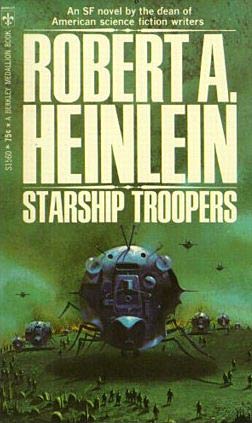 My Junior high school library had a copy of Starship Troopers on the shelf. I never read it. I had read some of the Robert Heinlein juveniles, and I think I assumed Troopers was another. I had also read a paperback copy of The Puppet Masters, which was one of my first forays into genuinely adult SF and of course I loved it. But I loved monsters more than military, and so Troopers never caught my attention although I loved that first quote, “Come on, you apes. You want to live forever?”
My Junior high school library had a copy of Starship Troopers on the shelf. I never read it. I had read some of the Robert Heinlein juveniles, and I think I assumed Troopers was another. I had also read a paperback copy of The Puppet Masters, which was one of my first forays into genuinely adult SF and of course I loved it. But I loved monsters more than military, and so Troopers never caught my attention although I loved that first quote, “Come on, you apes. You want to live forever?”
Soon I quit reading science fiction in general and I got the word that Heinlein was the bully pulpit for the military establishment. Boo. Hiss. So I was was surprised that the novel was not nearly so jingoistic as I expected. I think it would have defeated me, however, in seventh grade. Despite the good action and cool bugs, that middle section of officer training school would have done me in.
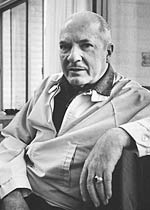 A couple of reviews I read emphasized that the novel should not be confused with what the reviewers obviously considered the vastly inferior Paul Verhoeven 1997 film version. These reviewers must be the true believers. I loved the movie when I first saw it and thoroughly enjoyed it watching it again after reading the novel the other day. Verhoeven passes Heinlein’s text through the deconstructionist mill. (Did Michel Foucault get a consulting credit?) I’ve already said the novel did not strike me as the jingoistic broadside I anticipated, but what fun to see these minor celebrities giving their severely limited all to this high-gloss parody of everything Heinlein must have held dear. There is a rumor that the actors, few of whom were the sharpest pencils in the studio box, had no idea they were being made fun of. I think that like most young actors with few credits to their names they were more interested in their paychecks than in the socio-political implications of their characters.
A couple of reviews I read emphasized that the novel should not be confused with what the reviewers obviously considered the vastly inferior Paul Verhoeven 1997 film version. These reviewers must be the true believers. I loved the movie when I first saw it and thoroughly enjoyed it watching it again after reading the novel the other day. Verhoeven passes Heinlein’s text through the deconstructionist mill. (Did Michel Foucault get a consulting credit?) I’ve already said the novel did not strike me as the jingoistic broadside I anticipated, but what fun to see these minor celebrities giving their severely limited all to this high-gloss parody of everything Heinlein must have held dear. There is a rumor that the actors, few of whom were the sharpest pencils in the studio box, had no idea they were being made fun of. I think that like most young actors with few credits to their names they were more interested in their paychecks than in the socio-political implications of their characters.
Book and film should absolutely be absorbed as a single experience. Probably the book should be read first, just so you do not have to picture Casper Van Diehm in the leading role until the last possible moment.
GMRC Review: Double Star by Robert A. Heinlein
 Guest Blogger, Allie McCarn, reviews science fiction and fantasy books on her blog Tethyan Books. She has contributed many great book reviews to WWEnd and has generously volunteered to write some periodic reviews for our blog.
Guest Blogger, Allie McCarn, reviews science fiction and fantasy books on her blog Tethyan Books. She has contributed many great book reviews to WWEnd and has generously volunteered to write some periodic reviews for our blog.
 Double Star by Robert A. Heinlein
Double Star by Robert A. Heinlein
Published: Astounding Science Fiction (Analog), 1956
Awards Won: Hugo Award, 1956
The Book:
“One minute, down and out actor Lorenzo Smythe was – as usual – in a bar, drinking away his troubles as he watched his career go down the tubes. Then a space pilot bought him a drink, and the next thing Smythe knew, he was shanghaied to Mars.
Suddenly he found himself agreeing to the most difficult role of his career: impersonating an important politician who had been kidnapped. Peace with the Martians was at stake – failure to pull off the act could result in interplanetary war. And Smythe’s own life was on the line – for if he wasn’t assassinated, there was always the possibility that he might be trapped in his new role forever!” ~WWend.com
I’ve read a fair amount of Heinlein (The Moon is a Harsh Mistress, Starship Troopers, Stranger in a Strange Land, and various short stories), and I enjoyed Double Star. It seemed much lighter and action-focused than other Heinlein novels I’ve read so far.
My Thoughts:
Double Star is a pretty short, fast-paced novel, with a kind of light, not-too-terribly-serious tone that made it a lot of fun to read. I don’t think that Double Star is really comedic sci-fi, but it just has an enthusiastic, good-natured attitude that really makes it easy to get caught up in the story. The novel focuses on the actor Lorenzo Smythe, the highly skilled—and incredibly conceited—man who gets caught up in the great impersonation. At first, I thought I would find his narration irritating, since he spends an awful lot of time thinking very highly of himself, or alluding to great works of theatre. However, his whole character seems to be treated with a certain amount of humor. Rather than making me roll my eyes, his pomposity seemed to invite laughter. I also really enjoyed the way his character develops throughout the story.
GMRC Review: Double Star by Robert A. Heinlein
 Sarah Pinsker (SarahPi) writes songs and short stories and the occasional review. She will be making use of her blog at sarahpinsker.com again sometime in the near future. This is Sarah’s first GMRC review.
Sarah Pinsker (SarahPi) writes songs and short stories and the occasional review. She will be making use of her blog at sarahpinsker.com again sometime in the near future. This is Sarah’s first GMRC review.
 A couple of years ago I attended an event at which Connie Willis spoke about her research for Blackout and All Clear. She referenced numerous romantic comedies and several war movies in addition to her factual historic research. I don’t recall that she brought up many works of fiction, but Double Star was one of them, and it stuck in my mind as something I wanted to read. Between the Hugo win and the subject matter, I thought it would be worth a try.
A couple of years ago I attended an event at which Connie Willis spoke about her research for Blackout and All Clear. She referenced numerous romantic comedies and several war movies in addition to her factual historic research. I don’t recall that she brought up many works of fiction, but Double Star was one of them, and it stuck in my mind as something I wanted to read. Between the Hugo win and the subject matter, I thought it would be worth a try.
Willis said that Double Star was inspired by the story of M. E. Clifton James, who was sent to North Africa and Gibraltar in Field Marshal Montgomery’s place in order to confuse the Germans. She borrowed these events in her own depiction of the intelligence war. Heinlein‘s version is less madcap than the Willis version, and possibly less madcap than the true story, given that James was an alcoholic and a smoker (and was missing a finger!) and Montgomery was not.
Double Star is fast paced and somehow manages a light tone despite the serious subject matter. The Great Lorenzo (nee Lawrence Smith) is an out of work actor when he is plucked out of a bar to perform the role of a lifetime: impersonating the kidnapped Expansionist leader John Joseph Bonforte. At the beginning, the actor’s character is painted somewhat broadly. He spends a lot of time talking about his own acting chops, and it takes the reader a while to trust that he is actually as good as he says. This journey mimics that of Bonforte’s inner circle, who agree to the deception out of desperation, but have little confidence that it will work.
Most of this shortish novel takes place over the span of a few weeks. It manages to flesh out the political situation fairly quickly, and with enough depth that there is a sense of what is at stake in the impersonation gambit. The character development of the support players is a little lacking, but Smith is fully realized, as is Bonforte in a more oblique fashion. It’s interesting to see Smith’s own fears and prejudice and strong personality twist to conform with the role he is forced to play.
 On the whole, I think this book has aged well, but as usual with mid-century SF I had some issues with the characterization of women. Smith learned his profession from his father, but doesn’t seem to have had a mother to speak of. Bonforte’s assistant, Penny, is intelligent, but also moody and petulant and subject to fainting spells. She is also deep in unrequited love for Bonforte. Thankfully, she is only threatened with a spanking once by a co-worker. If it had been twice I would have been tempted to put the book down.
On the whole, I think this book has aged well, but as usual with mid-century SF I had some issues with the characterization of women. Smith learned his profession from his father, but doesn’t seem to have had a mother to speak of. Bonforte’s assistant, Penny, is intelligent, but also moody and petulant and subject to fainting spells. She is also deep in unrequited love for Bonforte. Thankfully, she is only threatened with a spanking once by a co-worker. If it had been twice I would have been tempted to put the book down.
I’m glad I didn’t put it down. I was impressed by the taut plotting and the contained timeline. I’d be very curious to find out where the breaks were in the original Astounding serialization. The will-he-be-found-out moments dripped with suspense, and Smith’s personal journey was well depicted. This is a worthy Hugo winner, and I’d place it near the top of my personal best-of-Heinlein list.
GMRC Review: Farmer in the Sky by Robert A. Heinlein
 Jeremy Frantz (jfrantz) reviews SF/F books on his blog The Hugo Endurance Project where he has given himself just 64 weeks to read every Hugo Award winner. This is his third GMRC review.
Jeremy Frantz (jfrantz) reviews SF/F books on his blog The Hugo Endurance Project where he has given himself just 64 weeks to read every Hugo Award winner. This is his third GMRC review.
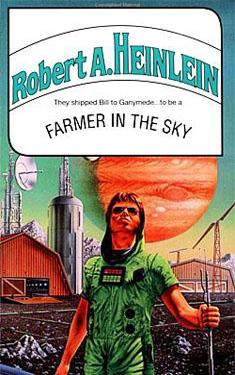 Farmer in the Sky is a YA title, of which Heinlein wrote over a dozen, and this was my first. Here, Bill Lermer and his father, George, have applied for permission to emigrate to Ganymede, the third moon of Jupiter. We follow them on their trip out and as they navigate the hardships of colonizing and farming the harsh moon’s lava-encrusted landscape and also deal with the occasional life-threatening disaster millions of miles from Earth.
Farmer in the Sky is a YA title, of which Heinlein wrote over a dozen, and this was my first. Here, Bill Lermer and his father, George, have applied for permission to emigrate to Ganymede, the third moon of Jupiter. We follow them on their trip out and as they navigate the hardships of colonizing and farming the harsh moon’s lava-encrusted landscape and also deal with the occasional life-threatening disaster millions of miles from Earth.
So (not) Heinlein
This is Heinlein’s second Hugo winner of the 1950’s, after Double Star (1956), (first technically, but it was a retro) and if there is anything similar about these two novels, it is the characters. They are the kind of people that no one really is, but everyone identifies as the kind of person they are or would like to be. Bill is just one of those characters (George too, but who cares about George really). I was sorry I didn’t read this book at a younger age because Bill was totally one of those characters who I would have tried so hard to emulate…and would have been so sad when I didn’t.
Apart from the characters, the style of the rest of the book was rather dry and straightforward and generally subdued compared to any of Heinlein’s other titles I’ve read. Somehow it seemed fitting considering the younger audience and it’s never dry to the point of boring, but it is a noticeable departure from I have become accustomed to in his later works (even Double Star).
Heinlein has also been credited through the years with a number of predictions of future technologies (though some, like GPS in The Number of the Beast, are debatable). It is always fun when a SF author predicts some crazy contraption and this is another of those situations. In Farmer in the Sky, Heinlein is said to have predicted the microwave oven. The story first appeared in Boys’ Life in 1950 and I’m not entirely clear on when microwave ovens were invented for home use so I can’t really add anything to that discussion other than continued mystery and intrigue. Nevertheless, if that’s your thing, then you may be interested.
Emigration
Bill’s Earth is overcrowded and seeing animals like mountain lions is rare, if there’s even any left. Aliens exist on Mars and Venus which, as we all know, I love to see and humans have already begun colonizing the solar system as far out as Jupiter’s moons. Back on earth, food has been rationed and with Bill’s mother dead, Bill cooks for his father and makes sure their meager rations are accounted for.
Things don’t seem to have reached Malthusian proportions yet, but life has definitely grown uncomfortable for the people on Earth. So when another ship is commissioned to send emigrants to Ganymede it is easy to understand Bill’s sudden interest without having to be told everything he ever thought about settling on another planet.
Heinlein actually does a pretty spectacular job of painting an extremely subtle picture of what life and Earth was like and allows the reader to fill in the gaps, which I also love. There are some times that the book is more Hard SF, but those are really just the parts of space travel and astronomy that Bill is interested in so it’s kind of fun that the book slips in and out of different styles.
Back to the point though, the reasons for emigrating at this point in the story are ostensibly just to alleviate the population pressures on Earth, but we come to understand that everyone really has their own reasons for leaving and a real sense of adventure pervades the first eight or nine chapters. Reading from a teenager’s perspective only added to the excitement and I had a lot of fun with it. Thinking about it now though, it is a little strange (in a good way) to think of how dangerous the journey out was but how light-hearted the book felt in the face of a lot of unknowns about what life would really be like on one of Jupiter’s moons.
And now for something completely different…
That is, until they actually reach the surface of Ganymede. Heinlein has let us have our fun and now he makes us pay up. From this point forward, everything is the worst and the universe sucks so I hope you weren’t too attached to the fun of getting out here. The material completely changes and the entire pace of the book slows down, in a really good way… Bill grows up.
 Of course, settling and attempting to farm a lifeless, freezing, lava-encrusted moonscape is going to be difficult and I guess you could expect this to happen, but then Heinlein piles on more. Disaster strikes the entire moon and nearly kills everyone and just as soon as we recover, Bill has a discussion with another settler/scientist who completely rocks his worldview. And right after that Bill stumbles on a discovery that changes everything he knows about the universe. I don’t want to give this away, but it gets pretty grim…and Bill handles it! Not handles it like some technology saves the day and “oh what a happy ending,” but he struggles with it internally and then consciously chooses to face a suddenly very foreboding future. How cool is that?! I thought it was great to see a young man deal with a problem in a way that most adults don’t. Read this kids!
Of course, settling and attempting to farm a lifeless, freezing, lava-encrusted moonscape is going to be difficult and I guess you could expect this to happen, but then Heinlein piles on more. Disaster strikes the entire moon and nearly kills everyone and just as soon as we recover, Bill has a discussion with another settler/scientist who completely rocks his worldview. And right after that Bill stumbles on a discovery that changes everything he knows about the universe. I don’t want to give this away, but it gets pretty grim…and Bill handles it! Not handles it like some technology saves the day and “oh what a happy ending,” but he struggles with it internally and then consciously chooses to face a suddenly very foreboding future. How cool is that?! I thought it was great to see a young man deal with a problem in a way that most adults don’t. Read this kids!
Recommendation
I really, really liked that Heinlein respected his younger readers enough to trust them to deal with some difficult topics. I’m a firm believer that adults expect too little of our younglings and while I’m not sure how I would have handled this in my early teens, I appreciated it now. Overall, if you’re in the mood for some juvenile fiction, Farmer in the Sky is definitely the way to go.
Starship Troopers
Very few science fiction novels have aroused such controversy over the decades as Starship Troopers by Robert A. Heinlein. This militaristic epic, winner of the 1960 Hugo Award, has been accused not merely of glorifying military values but of endorsing fascism to the point that one could say that the Terran Federation is analogous to Nazi Germany. An extreme analysis of course, which in our post-modernist world is terribly unfair, but there is no denying that Starship Troopers is indeed a pseudo-Darwinian rationale for an endless inter-species war of all against all. The novel, as it stands accused by many critics, rapidly degenerates into a series of lectures about politics, history and philosophy by way of various mouthpieces; and reverberates “that Heinlein voice.”
Oddly, I still found it compelling and stimulating, taking an interest in its political and moral philosophy rather than being converted to what is advocated in the text. It’s actually quite far from the fascism it is accused of. Anyone who can understand the oath may serve, regardless of their attributes or abilities. There are no wars within the human species, with lots of personal freedom, where almost everyone is reasonably well off and people who despise the government can do so openly and fearlessly.
A student of history will notice that the communal ideology of the alien “Bugs” is virtually identical to Western Cold War understanding of Communism and the Soviet Union. There is a delightful, explicit critique of Marxism as Rico concludes at one point:
“We were learning, expensively, just how efficient a total Communism can be when used by a people adapted to it by evolution; the Bug commissars didn’t care any more about expending soldiers than we care about expending ammo.”
Virulent anti-Communist! Undoubtedly right-wing in its politics and unashamedly militaristic but also one of the finest coming-of-age narratives in science fiction. We follow Rico’s rites of passage, making many mistakes along the way, and contrary to a glorifying view of war, avoiding blind heroism. (Don’t ever confuse the book with the movie sharing the same name!)
It is undeniably a significant work in the history of the genre, pioneering an entire sub-genre of military space opera, even if only paradoxical in that many, like Joe Haldeman and Orson Scott Card, have written fiction in conscious opposition to the philosophy espoused in Starship Troopers.
“To the everlasting glory of the infantry…”



















 Full Details
Full Details
